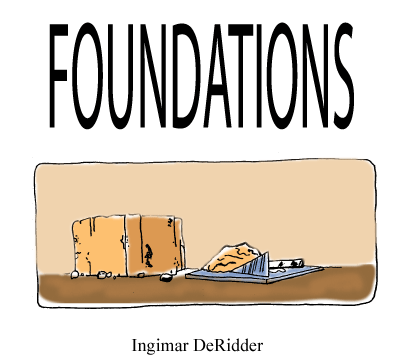
Give
"thou shalt not steal" Ex. 20:15

Eight- Give
If God were to give only one instruction about survival in a physical and material world none could be more succinct and sufficient than this: Thou shalt not steal. The eighth commandment is the protectorate of property and is the golden rule of all commerce. Though this commandment is one, it can be violated in a thousand ways. This important warning about acquiring wealth by illegitimate means is not weakened by Salvation but strengthened by it. Zachaeus came down from his perch in the Sycamore tree with a resolve to repair any damage he had done in violating this command. The proof of the power of any conversion is seen in its ability to penetrate the private economic life of an individual and then permeate his financial intercourse with the world. Christianity in no way threatens to remove the possessive pronouns from human speech. Every language speaks of and understands "his," "hers," "yours," and "mine." It is absurd to remove the very distinctions that measure such boundaries. Christianity does not tear down its neighbor's fence and confiscate property it has not rightly earned. Communism is not Christian. The genius of economics is rooted in laws of need and surplus and go beyond the scope of our discussion. Private property must be an accepted fact. Any attempt to eliminate just and lawful distinctions of ownership and property should be immediately rejected as an attempt to remove Christianity from the real world and relegate it to the realm of mystic meditations and useless fantasy. So let us realize that our faith is for this world as well as for the world to come. Let us also realize that God has given us a faith that is as practical as it is powerful. The eighth commandment addresses the fruits of life and the distribution of its harvest. As a conviction for Christian living it may be simply expressed by saying "I am a Steward." The Christian understands that material things are a stewardship and a sacred trust that is to be managed for the true owner. Everything is God's. What we possess in this world is merely on loan. Job was correct when he observed "naked I came into this world and naked shall I leave it" Job 1:21. The truth goes far beyond that however, for everyone shall give an account of their life and how they managed the resources God gave. "Unto whom much is given, much is required" Lk. 12:48 The world thinks it understands economics and industry. It has no way of knowing, the true value of things. Paul spoke of the "renewing of [our] mind." A true conversion changes the way we look at material things as well as spiritual things (Rom.12:2). Thou shalt not steal. There are many ways to violate this commandment. When we take property that rightly belongs to another our guilt is obvious, but this demon is legion and has many names: fraud, embezzlement, misappropriation, swindle, welsh, to name a few. We can steal time, ideas, and affections as well as material things. When someone uses someone else's words, thoughts, or ideas without permission of giving proper credit we are no less a thief
than a man stealing a dollar. Plagiarism is too often found in the pulpit when indolence leads one to pillage the studies, toil, and efforts of another and passes it off as original. The laws of copyright recognize the world of ideas and gives rightful title to the author. The Christian is careful not to borrow without asking, just as much as he would not take an apple off a cart without paying. In a world where hard work is as much in a musical score, as in a department store, we need to be careful to obey the laws of rightful ownership. The simplicity of using a copy machine, or a tape recorder sometimes clouds the rules of reason.
Stealing time is stealing money when the agreed upon value of an honest hour's work is not delivered as promised. Taking home items from the work place that do not belong to us is nothing less than pillaging, and millions of dollars are stolen every month not by criminals, but by employees.
One of the most misquoted Bible verses is found correctly in 1Tim. 6:10 "The love of money is the root of all evil." It is not money that is evil, but rather the insatiable lust people have for it. The love of money is the temptation few are willing to resist. And yet in both the Old and New Testaments we see real faith has broken free from this worldly love when it gives its love to God.
Moses did what the Rich Young Ruler failed to do. He gave up the treasures of Egypt when he realized they would be chains that would imprison his spirit. Satan tempted the Lord Jesus by offering him the riches of the world. Jesus, of course gave up far more than Satan could ever offer when he left the riches of heaven and became poor in order that we could be made rich.
We steal when we do not give a worker a fair wage, or charge more for something than is reasonable. The words "fair" and "reasonable" are open to interpretation and can only be defined by a consecrated conscience. It is well known that the poor often pay the most because they are the most desperate. The unsuspecting, and ignorant are often duped by what appears to be a bargain, when in fact it is closer to embezzlement.
There are some basic guidelines and considerations for the believer to follow in the material world and marketplace.
The first is that everything we own is actually a sacred trust from God. He is the owner. We are just the managers or stewards of the material things he has entrusted us with. One day the Master will return and ask us to "give account of our stewardship" Lk. 16:2.
One day the Lord shall check the ledger of our material life and we shall give account of every "farthing." Life is something that can be either "spent" or "invested" (Lk. 15, Matt.25). God expects a profit in the end. If God has given us time we must give account with what we did with it. If God has given us a home, a car, an educational opportunity, he will examine what we have done with what he gave us.
Ephesians 4:28 says, "Let him that stole, steal no more, but rather let him labor with his hands the thing which is good that he may have to give to him that needeth."
Every year we lived for self and without God we have stolen from his vineyard. Every day we lived for self we have consumed it upon our own lusts. "Let him who stole steal no more." The prophet Malachi asked the question "Will a man rob God?" Mal. 3:8. We have robbed God in many ways before we became Christians. Let us not rob him after we are saved as well. How and how often we have done so should cause us pause.
God required of his people only ten percent tribute, commonly known as the "tithe." It seems only reasonable and elementary that an investor receive some return for his investment. What Christian cannot agree that God has invested much in us. Our time, strength, thoughts, opportunities, all are owed to God and to God alone. "But thou shalt remember the LORD thy God: for it is he that giveth thee power to get wealth..." Deut 8:18. If it is the Lord that gives us the power, opportunity, and ability to get all that we have, is it unreasonable for him to ask that a recognition of that fact be found in the tithe?
To those who see Sinai in the tithe and reject it as a tax, we can only wonder at professions that don't effect possessions. Then there are those who are uncomfortable when we speak of a precise figure and protest an imagined legalism in the ten percent. It is true that the New Testament speaks of laying aside as the "Lord has prospered"(1Cor. 16:2), but does grace give less than law, or does the Lord deserve less than the Levite? While the legalist might have seen ten percent as the required minimum of temple giving, it was never considered the "outer limits." The high water mark of charity in the Christian should far exceed those who did not have the benefits we enjoy.
There is no better indicator of the spirit than what we do with the material. Anyone can say they love God. The Lord spoke about money more than any other subject. He warned about the deceitfulness of riches (Matt. 13). There are many reasons why riches may be called deceitful. One reason is the world does not know how to read its own accounts. They believe the man who has the most when he dies is the most successful. The world measures success in terms of "what we get" God measures success in terms of "what we give." The winner is not who "has the most" but rather who "gave the most." It's not what we keep, but what we give away that is the measure of a man's life.
That is why the widow who gave "two mites" was seen as giving more than all the wealthy who dropped large sums of money into the offering box (Luke 21:1-4). The Christian who begrudges giving a mere ten percent fails to understand that giving is the purpose of living. He who gives the most, lives the most.
Jesus said, "give, and it shall be given unto you; good measure, pressed down, and shaken together, and running over, shall men give into your bosom. For with the same measure that ye mete withal it shall be measured to you again" Lk. 6:38
Paul continued to expound the principle in his letter to the Corinthians, "But this I say, He which soweth sparingly shall reap also sparingly, and he which soweth bountifully shall reap also bountifully." (2Cor. 9:6).
If the rich young ruler had faith in Jesus Christ and understood this secret of spiritual economics he would have given away every penny he had, followed Jesus, and be richer than ever. But because he failed to realize that it was the very owner and giver of all that he had that was making the request that he "distribute his goods to the poor" he went away "sorrowing."
This eighth conviction is the logical conclusion of faith. God is not only the God of my spirit, my body, my heart, and my marriage, he is also the God of all I have. I am just a steward managing some of his affairs until he comes back.
